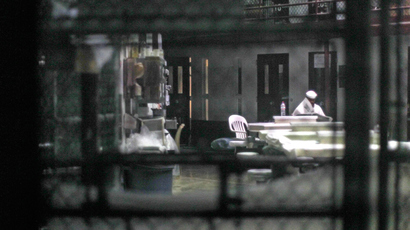Day 150: Gitmo hunger strike continues amidst world’s outrage
The hunger strike in Guantanamo detention facility enters its 150th day with prisoners accusing the guards of worsening treatment and abusive searches. Doctors urge to stop the force-feeding in the prison and more voices call to shut it down.
Follow RT’s day-by-day timeline of the Gitmo hunger strike
166 detainees are still in Guantanamo, of whom 106 are on hunger
strike, of which 45 are “on the enteral feed list”,
according to the prison’s authorities. The hunger strike began in
February after guards allegedly interfered with the inmates
personal belongings, including the mishandling of Korans.
Younous Chekkouri, who has spent 11 years in the jail for being a
suspected terrorist despite being cleared for release in 2010,
complains to his lawyer that Guantanamo guards are now punishing
him and other hunger strikers with extremely invasive body searches.
“The searches, as they like to call them, are spreading fear
and shame. Eight guards with the watch commander surround me in
one room, while two of them put their hands all over me. The
sexual assault hasn’t just happened to me. Why are they doing
this? That’s what I’d like to know,” he told Cori Crider, who
is also the strategic director for London based legal action
charity Reprieve, in a letter obtained by Al Jazeera.
Anne Richardson, a lawyer for one of the detainees, told RT in June that the inmates are being subjected to freezing temperatures in their cells and made to choose between shower and sleep, “punished and treated like animals.”

Ramzi Kassem, the lawyer of inmate Moath al Alawi, claimed that
his client was shot in April “for no reason”, sustained five wounds and was denied proper medical
help. This allegedly happened during a raid “that was just one
additional way that the prison administration wanted to try to
break the hunger strike.”
‘Force feeding is aggravated assault’
Earlier this month, lawyers for Guantanamo detainees filed a
motion with the US district court in Washington to stop the force
feeding, claiming that it was unethical and prevented their
clients from practicing their religion.
The United Nations human rights office has also
condemned the practice, saying that it amounts to “cruel,
inhuman and degrading treatment” and therefore is in breach
of the UN Convention on Human Rights to which the US is a
signatory.
This view was echoed by medical organizations in the US. In June, a group of
Boston based medical ethicists urged the Navy doctors carrying
out the force feeding to mutiny against the practice, and called
on civilian doctors to support them.
“Force-feeding a competent person is not the practice of
medicine; it is aggravated assault,” read the article.
The pressure from medical circles is on the rise. On June 19, over 150 doctors and medical professionals signed an open letter to Obama calling for the hunger strikers to receive independent medical care. Terry Kupers, a psychiatrist and consultant for Human Rights Watch, warned that if the hunger strike continues, the damage will be irreparable.
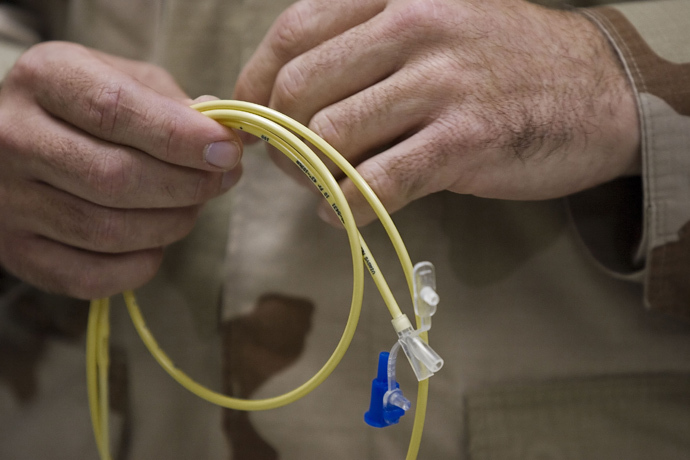
“After a month or two there is deterioration of organs. For
different people, it means different organs and different rate of
deterioration. But yes, in the length of time these individuals
have been on a hunger strike that is something one might expect
to see, and that is a great tragedy,” Kupers told RT.
Human Rights organizations including Amnesty International have also called for the
practice to be stopped and argued that the only answer was to
close the prison permanently, release those who have been cleared
and charge those who the US military has a case against.
Of the 166 detainees, 86 have been cleared for release, while 47
others are considered too dangerous for release but are not
facing prosecution, 24 more are considered eligible for
prosecution and just 9 have been charged with a crime or
convicted.
Hope-mongering
Obama has repeatedly said that he wants to close Guantanamo, but
it still remains open and the return of prisoners cleared for
release has stalled to just a trickle over the last year.
“It is expensive, it is inefficient. It hurts us in terms of our international standing. It lessens cooperation with our allies on counter-terrorism efforts. It is a recruitment tool for extremists. It needs to be closed,” said the president in May this year.
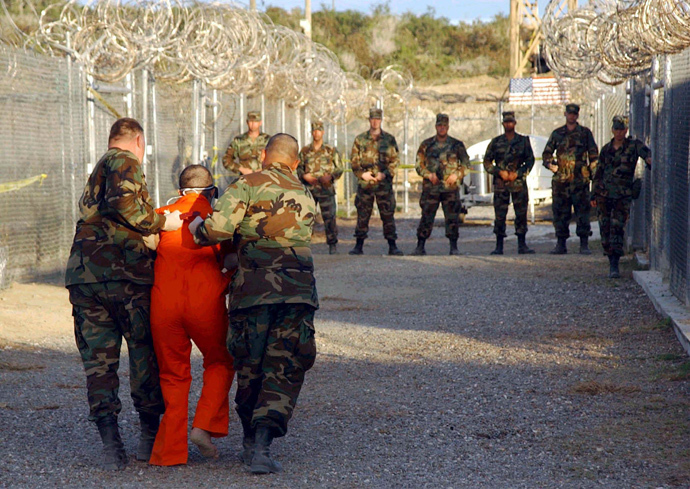
But several factors, Obama maintains, are stopping him from
closing the facility, which is tarnishing America’s reputation at
home and abroad.
Rather than replace Daniel Fried, who has been in charge of
trying to persuade other countries to take Guantanamo inmates
cleared for release, the state department lets him keep his job.
Obama has repeatedly blamed Congress for interfering with his
plan to close Guantanamo.
Congress stated in 2011 that the Defense Department had to
certify that a country a prisoner was returned to was not a state
sponsor of terrorism so that the individual would not be a future
threat to the United States.
However, in 2012 Congress waived some restrictions – but the
administration has not used the waiver or certification
provisions.
“For the past two years, our committee has worked with our Senate counterparts to ensure that the certifications necessary to transfer detainees overseas are reasonable. The administration has never certified a single transfer,” the House Armed Services Committee Chairman Howard Mckeon, a Republican said in May.
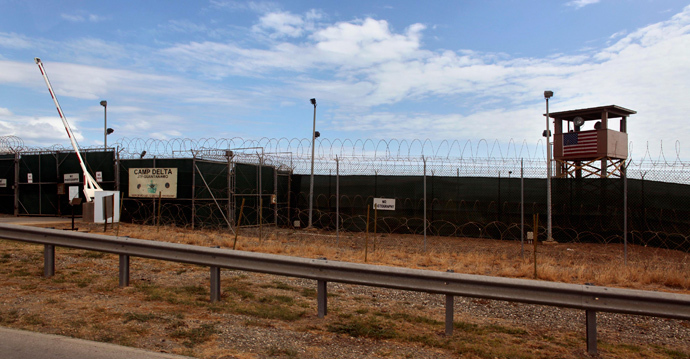
Furthermore in 2011 Obama signed an executive order, which
established extra review procedures for Guantanamo detainees to
determine whether continued detention were warranted but the
Period Review Boards, as they are known, have never been used.
In mid-June the US State Department appointed Cliff Sloan, a Washington lawyer, to oversee the closure of the Guantanamo Bay prison. On July 3 Sloan visited the facility assuring that "President Obama has been very clear as he laid out the goal, and the objective is to close Guantanamo." He however did not speak of force-feeding in the facility – or that inmates had been in and out of the hospital, their health deteriorating due to the hunger strike.
"I did have a chance to talk to medical officials,” is all
Sloan would say on the matter adding he gained "a very helpful
understanding from going there."
World rallying against Gitmo
The continuing existence of Guantanamo and the relentless hunger
strike has drawn the world’s scrutiny to the cause and anti-Gitmo
activism has seen a sharp spike.
Morris Davis, the former Chief Prosecutor for terrorism trials at Guantanamo Bay started an online petition hosted by the Change.org website.
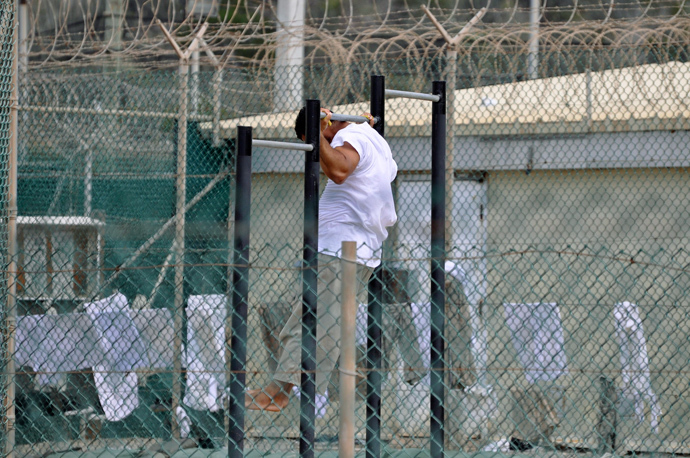
The petition already has over 226,000 signatures and calls on
President Obama to “direct Secretary Chuck Hagel to use his
authority to issue the certifications or national security
waivers required by the National Defense Authorization Act to
affect transfers from Guantanamo.”
Davis was a Guantanamo prosecutor himself for two years but
believes the system is failing to deal with the problem of the
inmates in a sensible and humane way.
“There is something fundamentally wrong with a system where
not being charged with a war crime keeps you locked away
indefinitely and a war crime conviction is a ticket home,”
writes Davies in the introduction to why he started the petition.
The hacktivist group Anonymous marked the 100th day of the hunger strike by mounting an on-line attack on the facility of “twitter storms, email bombs and fax bombs.”

“We stand in solidarity with the Guantanamo hunger strikers.
We will shut down Guantanamo,” a statement on the Anonymous
website read.
Even hawks such as republican senator John McCain have said there was support to shut down the facility and relocate the inmates to a facility on the US mainland in Illinois.
“There’s a renewed impetus and I think that most Americans are
more ready. We’re going to have to look at the whole issue,
including giving them more periodic reviews of their cases,”
he said on tour of the prison last month.













